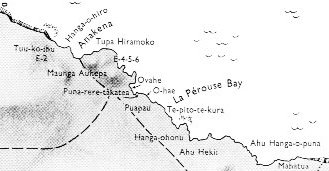12. Let us now complete the story: Everywhere the dream soul looked around for a residence for the king. The dream soul went to Maunga Teatea and gave him the name 'Maunga Teatea A Hau Maka O Hiva'. The dream soul of Hau Maka looked around. From Maunga Teatea she looked to Rangi Meamea (i.e., Ovahe).
Maunga Teatea (number 17) is presented as a male person. From there the kuhane looked ahead to Rangi Meamea (21) - although by far not yet there. Mauga means mountain and ragi means sky. Tea is white and mea is red. I imagine the name of the 17th station indicates 'hidden by rain' (Mgv.: teatea, heavy rain). By the logic of contrasts - so often used by the Polynesians in their various lists - must then follow the opposite, viz. a colourful sky. But to make this credible the kuhane had to look far ahead. The dream soul spoke the following: 'There it is - ho! - the place - ho! - for the king - ho! - to live (there in the future), for this is (indeed) Rangi Meamea.' The dream soul descended and came to Mahatua. She named the place 'Mahatua A Hau Maka O Hiva'. The dream soul continued to look around for a residence for the king. Having reached Taharoa she named the place 'Taharoa A Hau Maka O Hiva'. The dream soul moved along and reached Hanga Hoonu. She named the place 'Hanga Hoonu A Hau Maka O Hiva'. The dream soul came to Rangi Meamea and looked around searchingly. The dream soul spoke: 'Here at last is level land where the king can live.' She named the place 'Rangi Meamea A Hau Maka O Hiva'. The mountain she named 'Peke Tau O Hiti A Hau Maka O Hiva'. The dream soul moved along a curve from Peke Tau O Hiti to the mountain Hau Epa, which she named 'Maunga Hau Epa A Hau Maka O Hiva'. The dream soul went to the other side of the mountain Hau Epa. As soon as the dream soul looked around, she saw the sand (beach), which was very white and light. She remained there and explored everything. After she had looked around carefully, the dream soul of Hau Maka said, 'Ah! This is the place that will serve as a residence for the king. She named the place 'Oromanga A Hau Maka O Hiva' and also named the neighboring bay 'Hanga Moria One A Hau Maka O Hiva'. The dream soul stepped forth lightly and reached Papa O Pea. She carefully looked around for a place where the king could settle down after his arrival and gather his people around (? hakaheuru). Having assembled his people (?) and having come down, he would then go from Oromanga to Papa O Pea, so went the speech of the dream soul. She named the place 'Papa O Pea A Hau Maka O Hiva'. She then hastened her steps toward Ahu Akapu. There she looked again for a residence of the king. Again the dream soul of Hau Maka spoke: 'May the king assemble his people (?) and may he come in the midst of his people from Oromanga to Papa O Pea. When the king of Papa O Pea has assembled his people (?) and has come to this place, he reaches Aha Akapu. To stay there, to remain (for the rest of his life) at Ahu Akapu, the king will abdicate (?) as soon as he has become an old man'. She named the place 'Ahu Akapu A Hau Maka O Hiva'. The (entire) land she named 'Te Pito O Te Kainga A Hau Maka O Hiva'. The dream soul turned around and hurried back to Hiva, to its (Home)land, to Maori. She slipped into the (sleeping) body of Hau Maka, and the body of Hau Maka awakened. He arouse and said full of amazement 'Ah' and thought about the dream ... |
